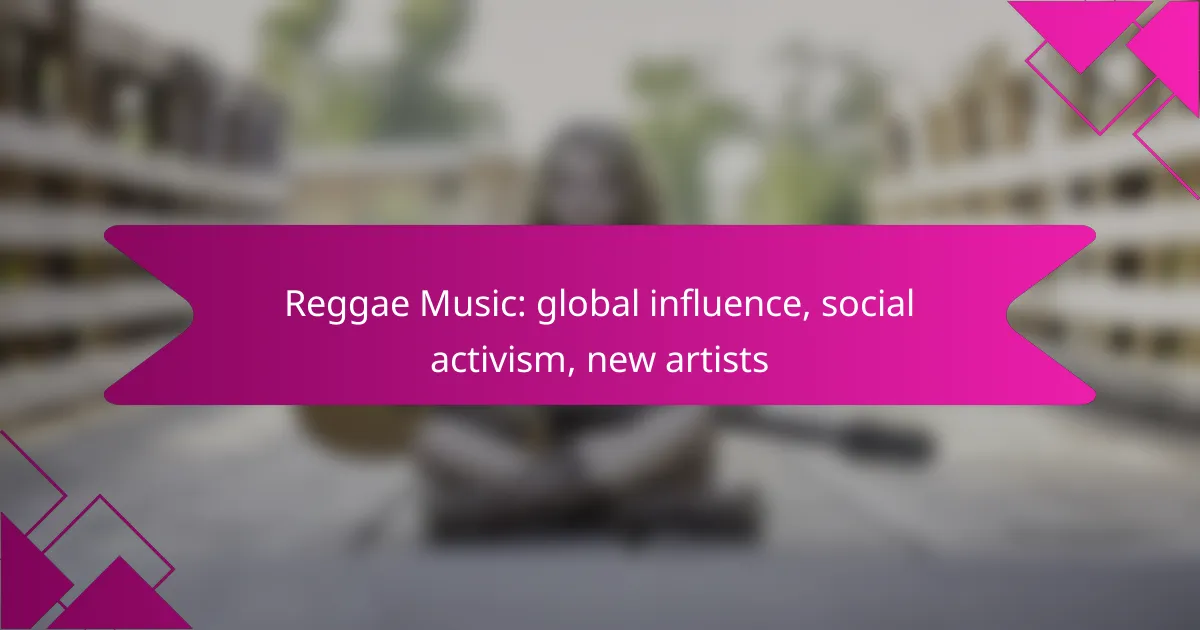Reggae music has a profound global influence, championing messages of peace, social justice, and unity that resonate across diverse cultures. As a powerful tool for social activism, it raises awareness of injustices and inspires movements through its compelling rhythms and lyrics. Today, new artists like Protoje, Koffee, and Chronixx are revitalizing the genre, infusing it with fresh sounds and impactful messages that continue to expand reggae’s reach and relevance worldwide.
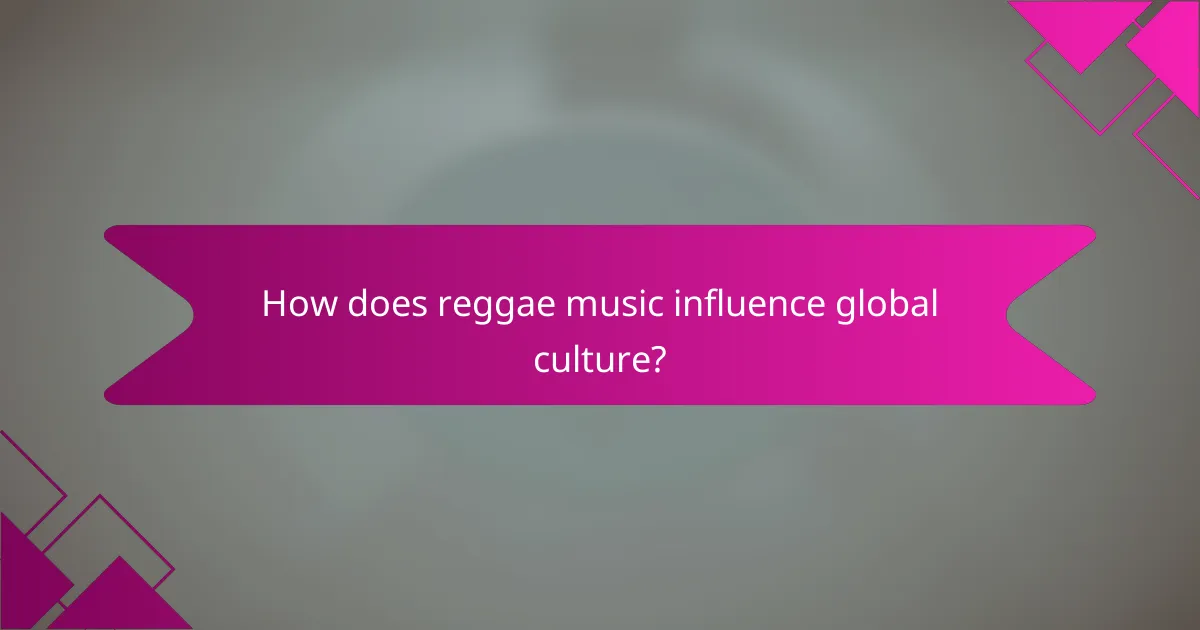
How does reggae music influence global culture?
Reggae music significantly influences global culture by promoting messages of peace, social justice, and unity. Its rhythms and themes resonate across diverse communities, inspiring movements and shaping various artistic expressions worldwide.
Impact on social movements
Reggae has been a powerful voice for social activism, particularly in advocating for human rights and equality. Artists like Bob Marley and Peter Tosh used their music to address issues such as poverty, racism, and political oppression, inspiring listeners to engage in social change.
In many countries, reggae music has become anthems for various social movements, including anti-apartheid efforts in South Africa and civil rights campaigns in the United States. The genre’s ability to convey deep emotional messages makes it a rallying cry for those seeking justice.
Integration into popular music
Reggae’s influence extends into mainstream popular music, with artists from various genres incorporating reggae elements into their work. Genres like hip-hop, rock, and pop frequently sample reggae rhythms or collaborate with reggae artists, creating a fusion that broadens reggae’s reach.
Notable examples include collaborations between reggae artists and pop stars, which have led to chart-topping hits. This integration not only introduces reggae to new audiences but also highlights its cultural significance in the global music landscape.
Influence on fashion and lifestyle
The reggae culture has significantly impacted fashion and lifestyle, promoting a laid-back, vibrant aesthetic. Iconic styles such as Rasta colors (red, yellow, green) and dreadlocks have become symbols of the reggae movement, influencing fashion trends worldwide.
Beyond clothing, reggae promotes a lifestyle centered around peace, love, and community. Festivals celebrating reggae music often feature not only performances but also art, food, and cultural exchanges, further embedding reggae’s influence into everyday life.
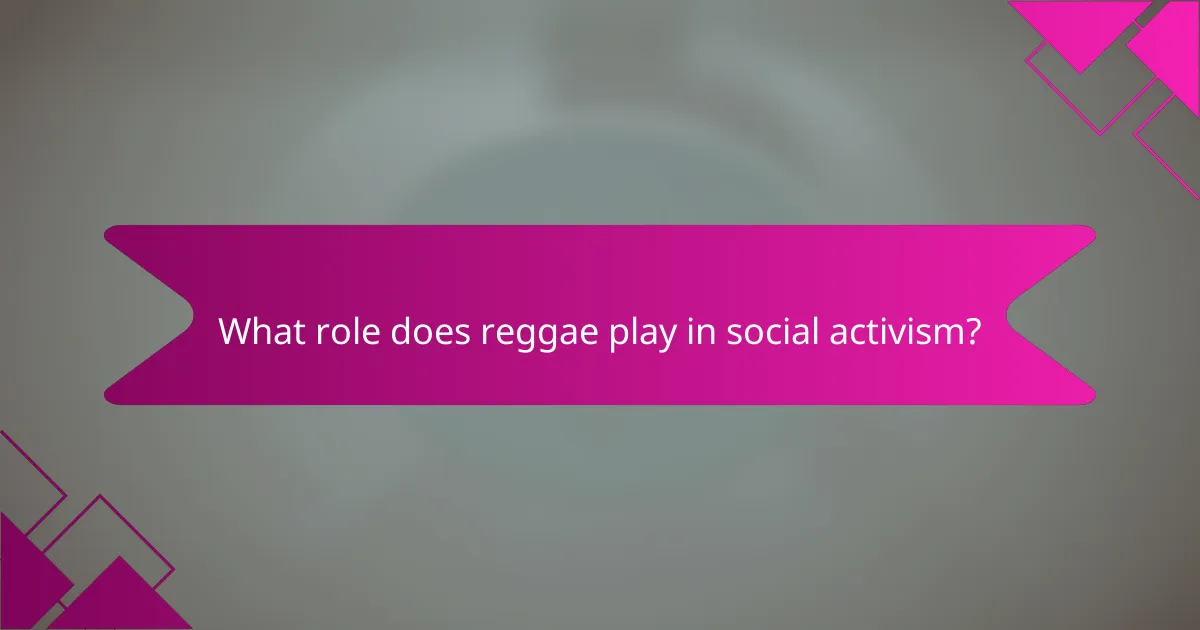
What role does reggae play in social activism?
Reggae music serves as a powerful tool for social activism by conveying messages of resistance and empowerment, supporting humanitarian causes, and collaborating with global activists. Through its lyrics and rhythms, reggae raises awareness about social injustices and inspires action among listeners.
Messages of resistance and empowerment
Reggae often addresses themes of oppression, inequality, and resilience, making it a voice for marginalized communities. Artists like Bob Marley and Peter Tosh have famously used their music to challenge systemic injustices and promote social change.
These messages resonate globally, empowering listeners to confront their own struggles and advocate for their rights. The genre’s emphasis on unity and strength encourages collective action against societal issues.
Support for humanitarian causes
Many reggae artists actively support humanitarian initiatives, using their platforms to raise funds and awareness for various causes. Concerts and festivals often feature charitable components, with proceeds directed towards education, health care, and disaster relief efforts.
For example, the One Love Peace Concert in Jamaica in 1978 aimed to unite a divided nation and promote peace, showcasing how reggae can mobilize support for critical social issues.
Collaboration with global activists
Reggae musicians frequently collaborate with activists and organizations worldwide to amplify their messages. These partnerships can lead to impactful campaigns that address global challenges such as poverty, climate change, and human rights violations.
Through events and social media, reggae artists connect with diverse audiences, fostering a sense of global solidarity. This collaboration enhances the reach and effectiveness of their activism, making reggae a vital part of the international social justice movement.
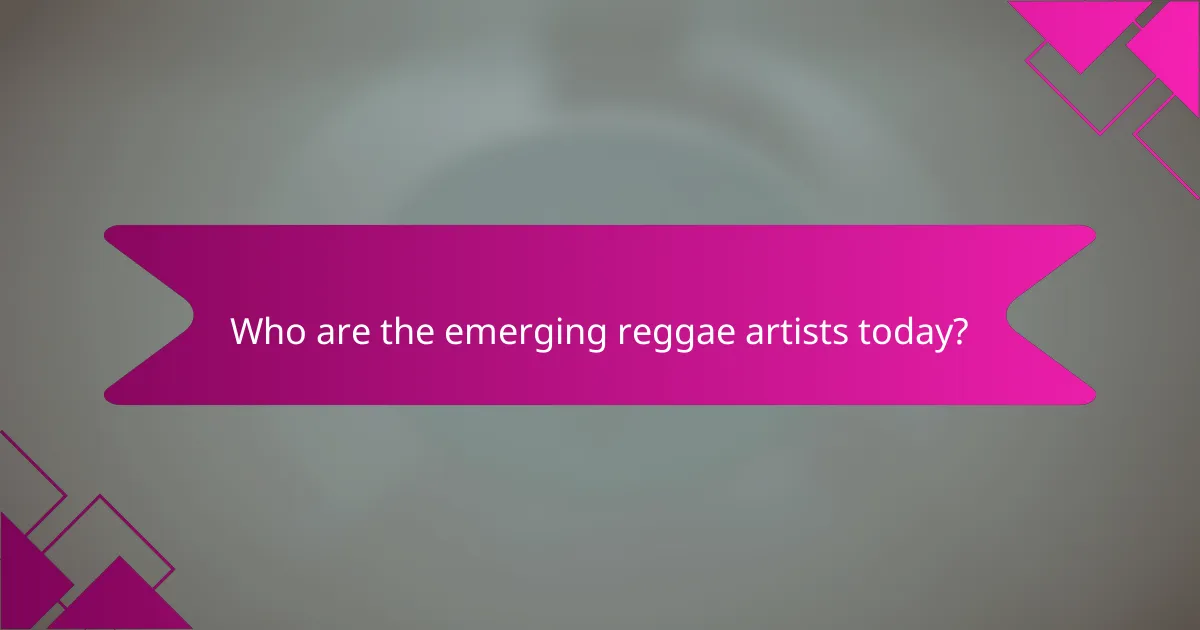
Who are the emerging reggae artists today?
Emerging reggae artists today are reshaping the genre with fresh sounds and impactful messages. Notable figures include Protoje, Koffee, and Chronixx, each contributing uniquely to reggae’s evolution and global appeal.
Protoje’s contributions
Protoje is a pivotal figure in the modern reggae scene, known for blending traditional reggae with contemporary influences. His music often addresses social issues, making it both relevant and resonant with younger audiences.
His albums, such as “A Matter of Time,” have received critical acclaim and have helped to revive interest in reggae music worldwide. Protoje’s collaborations with other artists further amplify his reach and impact.
Koffee’s rise in popularity
Koffee has quickly become a prominent voice in reggae, especially after her breakout single “Toast.” Her youthful energy and innovative style attract a diverse audience, bridging gaps between reggae and other genres like dancehall and hip-hop.
With awards such as the Grammy for Best Reggae Album, Koffee’s influence is undeniable. She represents a new generation of artists who use their platforms for social activism, addressing issues like youth empowerment and equality.
Chronixx’s impact on the genre
Chronixx has made significant strides in bringing reggae back to its roots while infusing it with modern elements. His music often reflects themes of resistance and cultural pride, resonating deeply with fans both in Jamaica and internationally.
His debut album, “Chronology,” showcases his versatility and has solidified his status as a leading figure in the reggae revival. Chronixx’s performances are known for their energy and connection to the audience, further enhancing his impact on the genre.
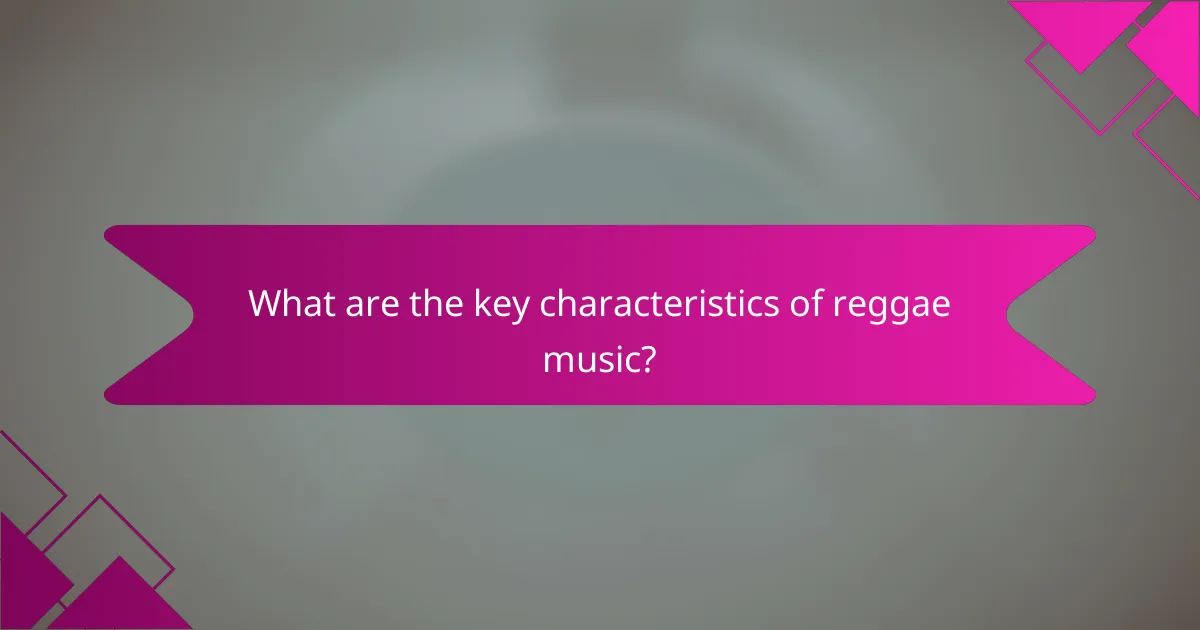
What are the key characteristics of reggae music?
Reggae music is characterized by its distinctive rhythm, instrumentation, and lyrical content that often addresses social and political themes. Originating in Jamaica, reggae blends various musical influences and has evolved to become a global phenomenon.
Rhythm and instrumentation
The rhythm of reggae is marked by a strong backbeat, typically emphasizing the second and fourth beats in a measure. This offbeat guitar or piano strumming, known as the “one drop” rhythm, creates a laid-back feel that is central to reggae’s sound.
Instrumentation in reggae often includes electric guitars, bass, drums, and keyboards, with the bass guitar playing a prominent role. The use of horns and percussion instruments like the tambourine and congas can also enhance the musical texture.
Lyrical themes and storytelling
Reggae lyrics frequently explore themes of social justice, love, and resistance against oppression. Artists use storytelling to convey messages about inequality, spirituality, and personal experiences, making the music both relatable and impactful.
Many reggae songs incorporate elements of Rastafarian culture, reflecting beliefs and practices that emphasize unity, peace, and respect for nature. This connection to cultural identity adds depth to the lyrical content.
Cultural roots and origins
Reggae originated in Jamaica in the late 1960s, evolving from earlier musical styles such as ska and rocksteady. It is deeply rooted in the island’s history, reflecting the struggles and aspirations of its people.
The genre gained international recognition through artists like Bob Marley, who played a crucial role in popularizing reggae worldwide. Today, reggae continues to influence various music styles and remains a powerful vehicle for social activism and cultural expression.
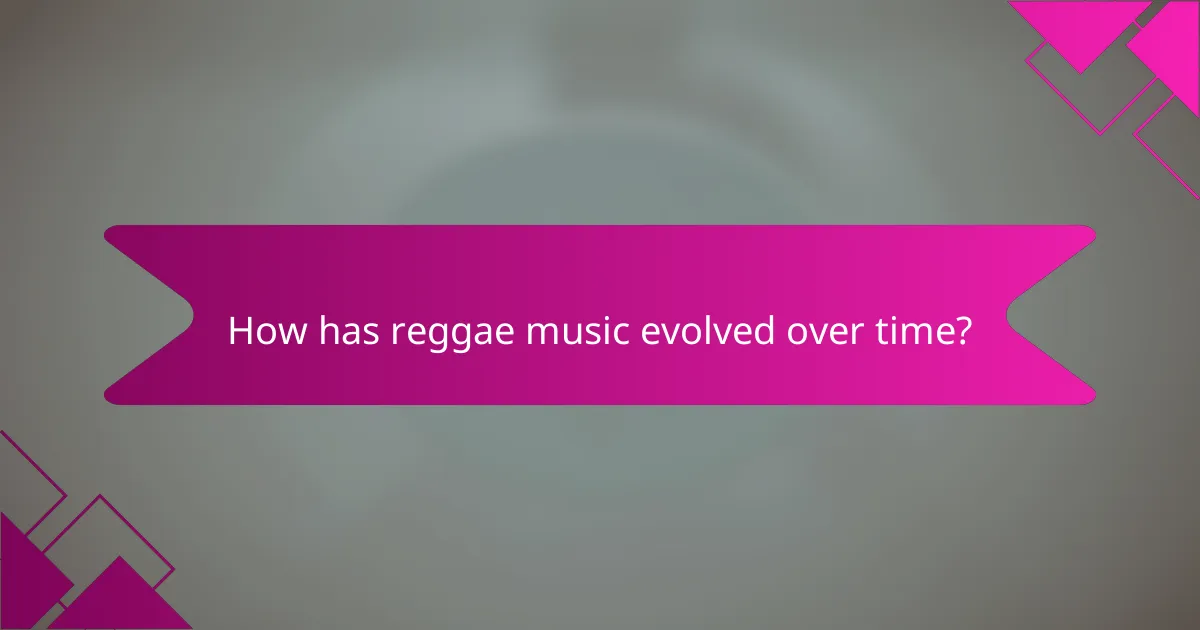
How has reggae music evolved over time?
Reggae music has transformed significantly since its inception in the late 1960s, evolving through various styles and influences. From its roots in ska and rocksteady, reggae has incorporated elements from other genres, reflecting social changes and technological advancements.
From ska to modern reggae
Reggae originated from ska, a genre characterized by upbeat rhythms and horn sections, which emerged in Jamaica during the 1960s. As the sound matured, rocksteady emerged, slowing the tempo and emphasizing bass lines, which laid the groundwork for reggae. Modern reggae continues to evolve, integrating influences from hip-hop, dancehall, and even electronic music.
Artists like Bob Marley popularized reggae globally, but today, new artists are pushing the boundaries of the genre. Contemporary reggae often blends traditional elements with modern sounds, creating a diverse range of styles that appeal to younger audiences.
Influence of technology on production
The evolution of technology has significantly impacted reggae music production, making it more accessible for artists worldwide. Digital audio workstations (DAWs) and affordable recording equipment allow musicians to produce high-quality tracks from home studios. This democratization of music production has led to an explosion of new reggae artists and sounds.
Moreover, advancements in streaming platforms have changed how reggae is distributed and consumed. Artists can now reach global audiences without traditional record labels, allowing for a more diverse range of voices and styles within the genre.
Global collaborations and fusions
Reggae’s influence has sparked numerous global collaborations, resulting in unique fusions with various music styles. Artists from different cultures are increasingly incorporating reggae elements into their work, creating hybrid genres that resonate with diverse audiences. For example, reggae has blended with hip-hop, jazz, and even K-pop, showcasing its versatility.
Collaborations with international artists have not only expanded reggae’s reach but also enriched its sound. These partnerships often highlight social issues and cultural narratives, reinforcing reggae’s roots in activism and community engagement.
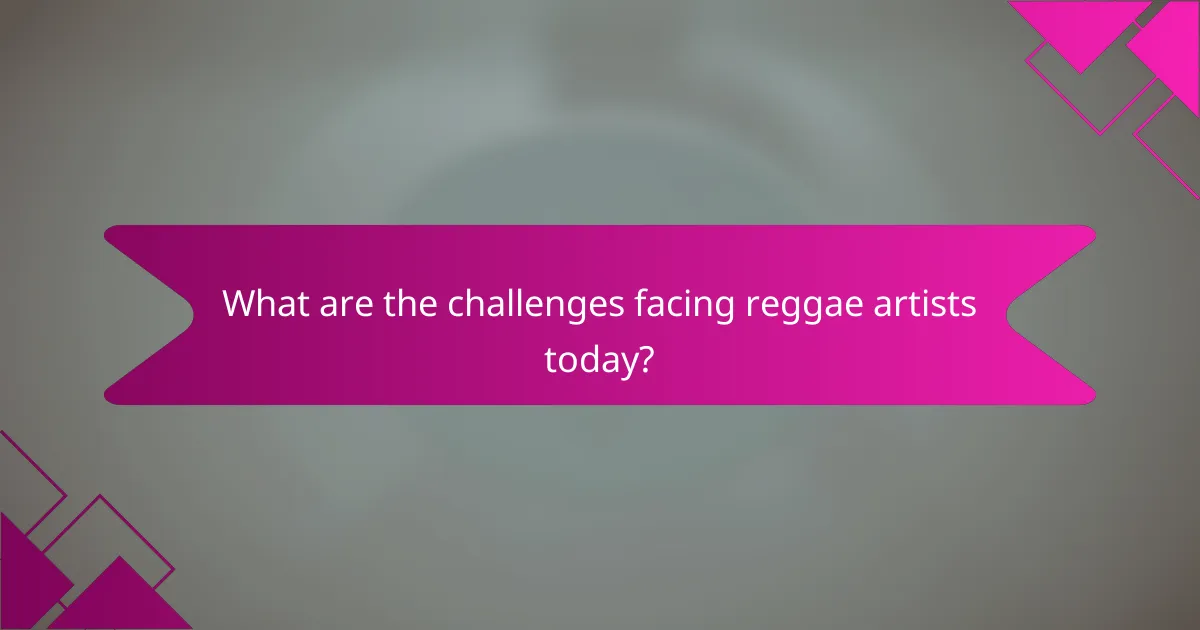
What are the challenges facing reggae artists today?
Reggae artists today encounter several challenges that affect their careers and the genre’s evolution. Key issues include market saturation, the struggle to maintain authenticity, and limited access to global platforms.
Market saturation and competition
The reggae music scene has become increasingly crowded, with numerous artists emerging from various regions. This saturation makes it challenging for new and established musicians to stand out and gain recognition. Artists must employ innovative marketing strategies and unique sounds to capture audience attention.
Moreover, the rise of digital platforms has led to a global influx of reggae music, intensifying competition. Artists need to leverage social media and streaming services effectively to reach wider audiences and differentiate themselves from others in the genre.
Maintaining authenticity
As reggae evolves, some artists face pressure to adapt their sound to mainstream trends, risking their authenticity. Staying true to the roots of reggae, which often includes themes of social justice and cultural identity, is crucial for many musicians. Balancing commercial success with artistic integrity can be a delicate task.
Artists should focus on incorporating traditional elements into their music while exploring new styles. Collaborating with veteran reggae musicians can also help maintain authenticity and provide valuable insights into the genre’s heritage.
Access to global platforms
While digital platforms have opened doors for many reggae artists, access can still be uneven. Some musicians may struggle to get their music featured on popular streaming services or playlists, limiting their exposure. Building relationships with curators and influencers in the music industry can enhance visibility.
Additionally, artists should consider participating in international music festivals and events to showcase their work. These opportunities can help them connect with a global audience and industry professionals, ultimately expanding their reach and impact.
